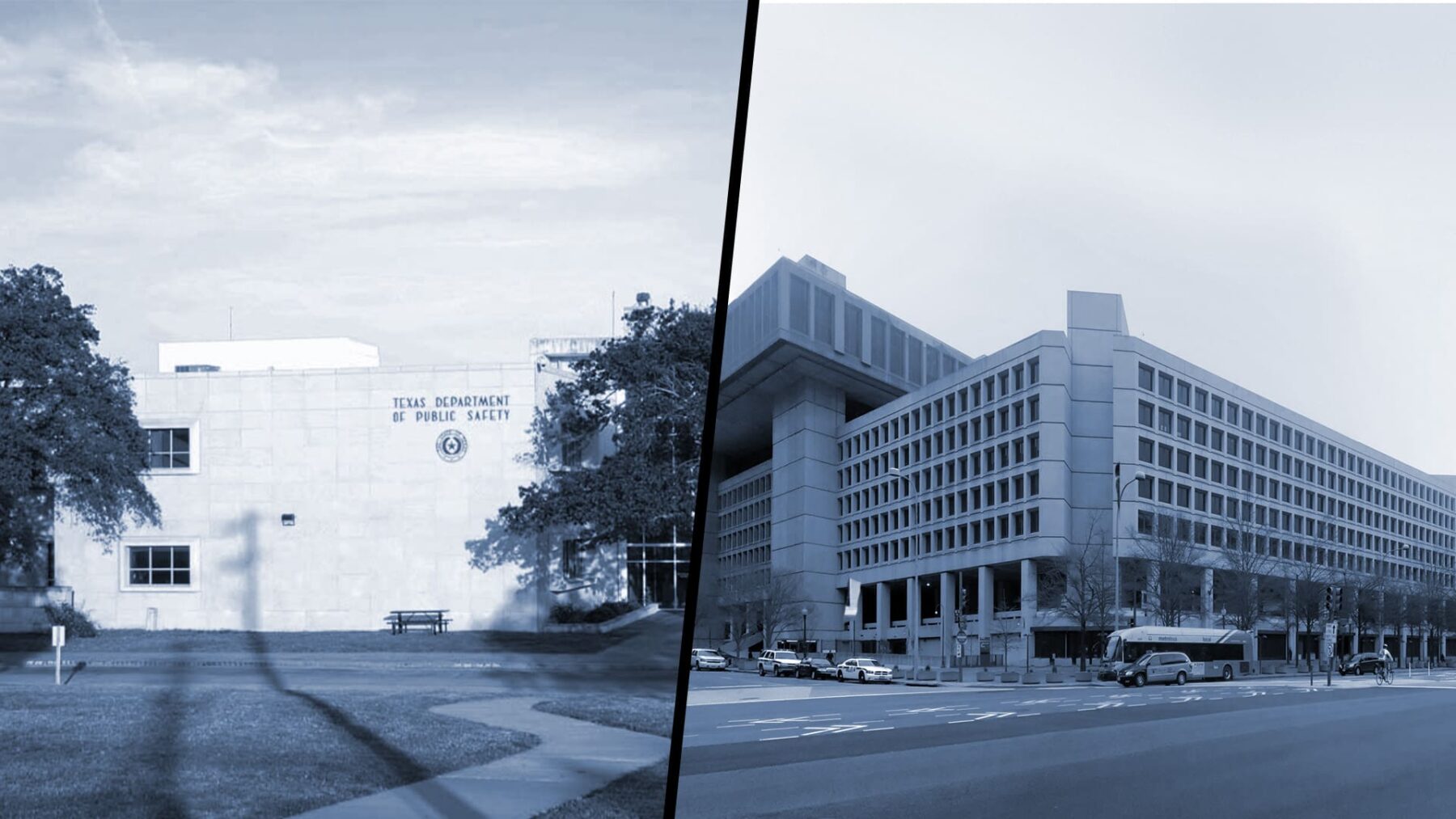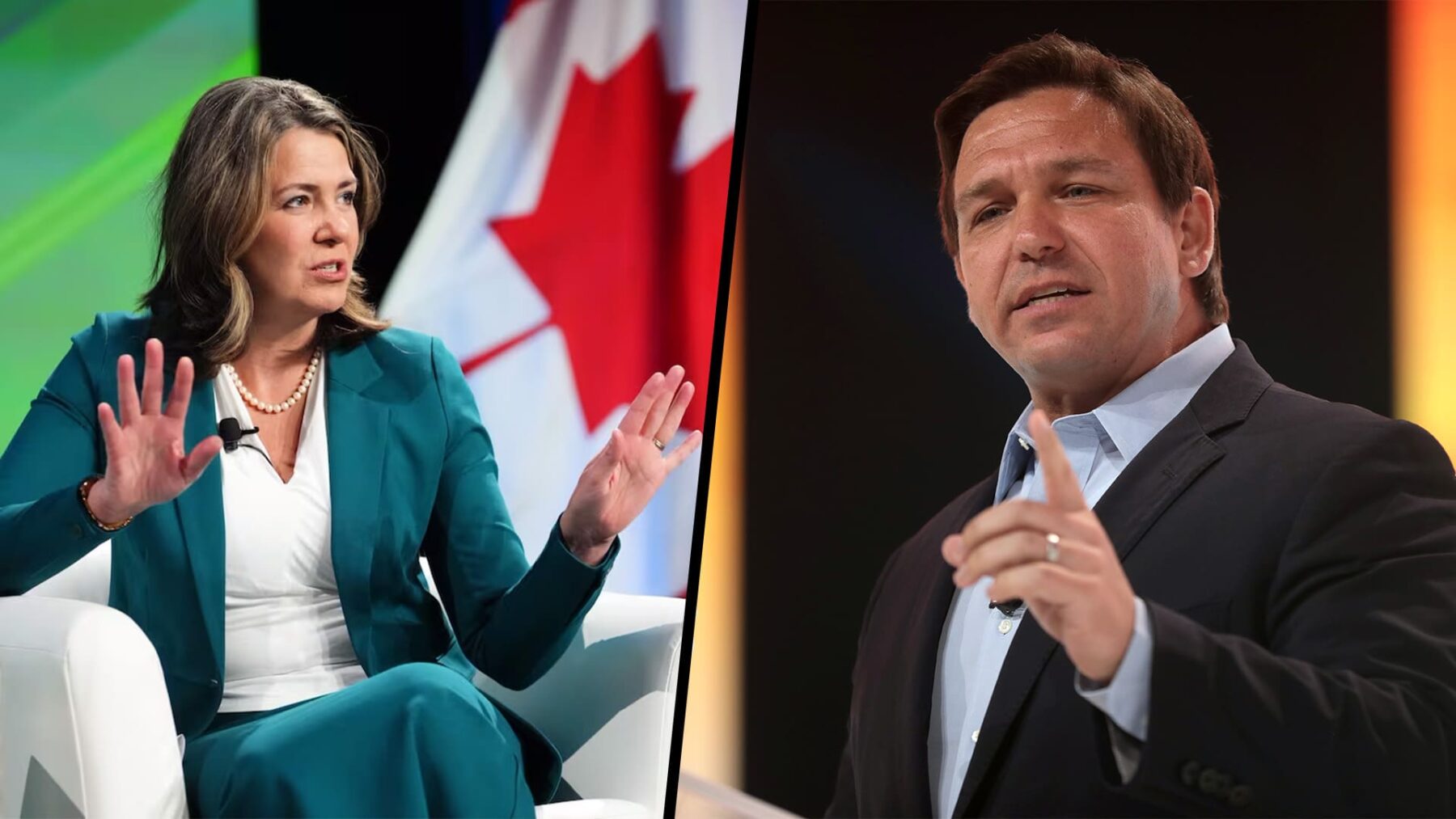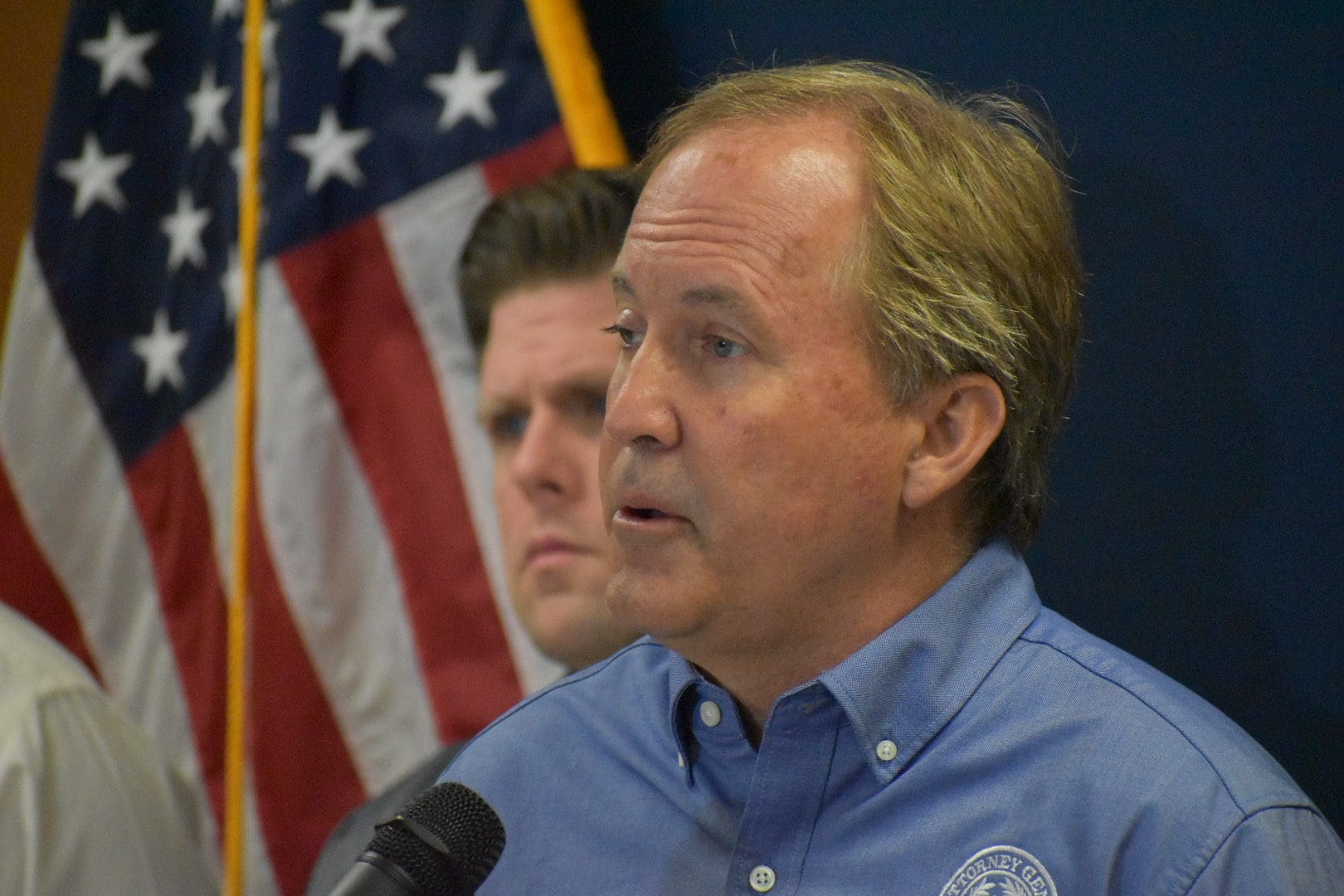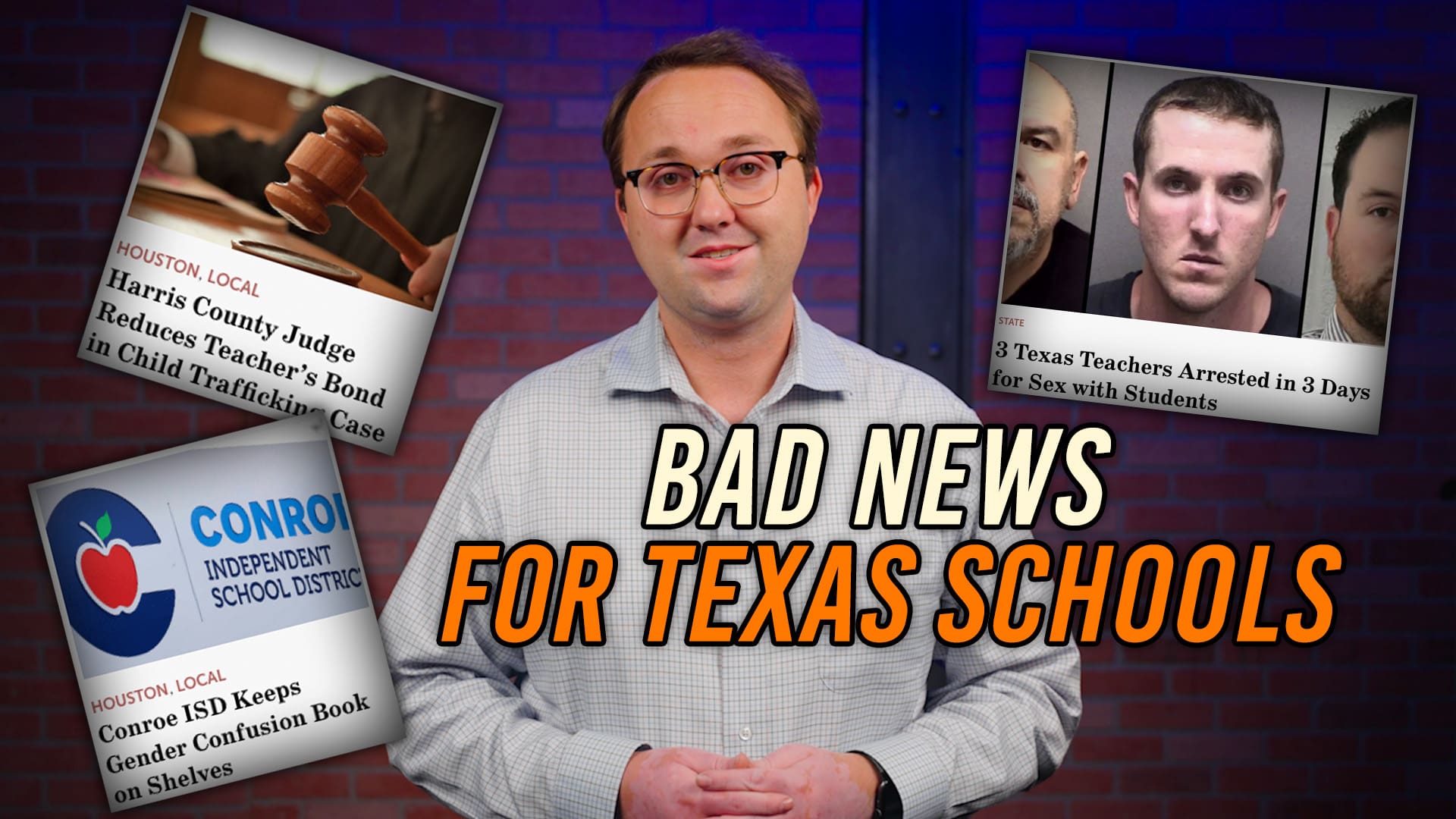Large elements of the federal government have set themselves against justice and the American people. State public servants must shield Texans from the increasingly tyrannical federal government.
Over time, the federal government has increased in power and tyrannical behavior, targeting political opponents and citizens. It has also turned federal taxpayer monies into an arsenal of wokeness that seeks to warp American culture.
This raises questions about how entangled the federal government is with Texas government, and what actions the state can take to protect Texans.
Culture War
“Certainly, there are many aspects of the federal government that are woke and weaponized against the American people,” Wade Miller, interim vice president at the Center for Renewing America, told Texas Scorecard in an interview. “It’s not isolated to just one agency or area of the government. It’s spread throughout. It kind of varies in degrees of seriousness.”
What Miller described sounded like American taxpayer monies were funding a gigantic aircraft carrier that was dropping bombs of wokeness into our national culture. “In every agency, we can find varying degrees of woke and weaponized ideologies and activities that are being targeted to infringe against the American people,” he said.
Attorney Tony McDonald points out one of the critical actors pulling the levers of government in this saga. “You do have an extreme element on the left in this country, operating at the federal level, that is trying to destroy the United States, as people know it, and create something different,” he told Texas Scorecard. “They are trying to demoralize Americans, instill chaos in major cities, and they are openly rewarding illegal immigration into the country, it’s pretty clear with a goal to change the nature of the country. To replace the people who are here with people from abroad, basically in the aims of changing politics. You actually see the Democrats brag about this.”
Miller shared how federal taxpayer monies are being used by the federal government to push wokeness. He used the grant process as an example. “The American taxpayer through just the grant process alone is funding more of the progressive left activist agenda than George Soros or Arabella combined.” Additionally, Miller said that federal taxpayer monies are pushing wokeness in American universities. However, the wording within the grant itself may not indicate what it is funding. “But if you look at the recipient list, it’s overwhelmingly woke and weaponized,” Miller explained. He mentioned a grant going to the University of Maryland Medical Center to help finance child gender mutilation procedures.
“Also, money is fungible. A lot of these universities will get these grants, but then that just frees up the ability for them to fund other activities. And the Biden administration itself has been overly supportive of DEI officers within academia,” Miller said. “Increasingly, there’s a kind of an unspoken threat—although it may be spoken, but I haven’t seen it—that universities have to start looking at things through this lens, or else they could face DOJ pushback.”
“Fiscal fights are not a spreadsheet problem; they’re a culture problem,” Miller said. “We have to connect those spending fights to woke and weaponized abuses of the federal government, and how that’s being used to really infuse woke ideology throughout all of our society. “But I think that some of the most concerning stuff, aside from the blatant abuses of power, is the increasing degree to which we see these agencies trying to partner with corporate America and the media to do its dirty work.
The knee-jerk reaction in most liberty fights appears to be running to the federal courts, but how reliable are they? “They’re just not reliable,” McDonald said. “They’re not going to be reliable in a pinch, and they’re only really going to be reliable on kind of an obvious case.”
The reality, according to McDonald, is that courts are limited in the solutions they offer. “Courts basically do two things: they award a judgment for money, which you can go about collecting through various means … or they can issue an injunction and tell some party to stop doing something,” he said. “That’s all you’re really going to get typically out of court. There are situations with mandamus, where you can go to a court and you can say to a court, ‘Hey, this governmental official is obligated to take this particular action.’ The court might step in and order that person to take that action. But that’s extremely rare.”
Fighting Transparency
The federal government under the Biden administration has not attempted to hide its undermining of Texas’ attempts to secure her open border to the south. One of these actions occurred in July 2023 when the U.S. Justice Department sued Texas over its buoy border barrier in the Rio Grande River. On July 24, Gov. Greg Abbott replied, “Texas will see you in court, Mr. President.”
An event took place three days later that raises questions. The Texas Tribune reported that during a joint oversight hearing, the U.S. Capitol Police (USCP)—a force charged with protecting Congressmen and Congress—would open a field office in Texas, claiming concerns about threats against Congressmen. USCP’s Chief J. Thomas Manger said offices would also open in Milwaukee and Boston.
After the events of January 6, 2021, USCP opened its first field offices in Florida—a state that under Gov. Ron DeSantis came out strongly opposing federal tyranny—and California.
Texas Scorecard asked Miller if the USCP Texas field office announcement, and Abbott’s defiant response to Biden, were too close to be a coincidence. “I don’t know if there’s a connection between the two things you’re talking about or not, but it’s an interesting conversation to have,” Miller told Texas Scorecard. “I do know that it is true that there has been an increase in threats against members of Congress and their families. I think that that’s been lopsidedly true against Republicans.” In the Texas Tribune article, U.S. Sen Ted Cruz (R–TX) reportedly said in the joint oversight hearing that a Senate staffer had been “repeatedly stabbed in broad daylight” in the U.S. Capitol and expressed concern about threats against both Democrats and Republicans.
However, Miller wasn’t sure if field offices in other states were the appropriate response. “Unless they think that they actually need to provide on-site security, and increasing [sending] them out, then I just don’t see the need for an actual office. Just work with local law enforcement, as they have done in the past.”
Texas Scorecard attempted to learn more about this USCP Texas field office. Unfortunately, this part of the federal government is exempt from the Freedom of Information Act. Texas Scorecard sent an open records request to the Texas Department of Public Safety, requesting the following from 2016 to the date a search was conducted:
- Records of all contracts, MOUs, and/or agreements with the United States Capitol Police (USCP) Department.
- Records of all USCP stations or operations in Texas, and dates of when they were created.
- Records of all collaboration efforts between DPS and USCP.
USCP learned of our request. They decided to fight against transparency. On September 5, 2023, Karen Davis Miller, Deputy General Counsel for the USCP, informed Texas Scorecard they asked the Texas Attorney General’s Office to withhold records. She attached a copy of their letter to the TXAG.

U.S. Capitol Police
“The United States Capitol Police (USCP) has reviewed the provided documents identified by the Texas Department of Public Safety as responsive to DPD PIR # 23-2287, and determined that all the information contained therein is information relating to the protection and safety of individuals, including Members of Congress, under the jurisdiction of the USCP,” she wrote. “Such information is statutorily protected under 2 USC $1979, and therefore, cannot be disclosed.”
In the July 27 announcement of the new field office, no location had been decided. On December 6, 2023, Texas Scorecard sent inquiries to DPS and USCP asking if the field office was now operational, and if there were any substantial threats against Texas Congressmen.
Specifically to USCP, Texas Scorecard asked for the approximate size of the USCP force, how long the decision process took that led to placing a field office in the state, who made the final decision, and why this was preferential to working with state and local law enforcement.
Neither office provided a response to our questions before publication.
However, Texas Scorecard was successful in obtaining records of DPS’ other connections with federal agencies.
Federal Research Programs
Taking into consideration how “woke and weaponized” the federal government has become casts a shadow over agreements Texas has with Washington, D.C. outside the U.S. Constitution.
For Texas to get to a place where her citizens are shielded from federal tyranny, it is important to know the connections between the state and D.C. What follows in this article is not an exhaustive review of all such agreements, but an examination of some, to provide a clearer picture of where Texas is today relative to Washington, D.C.
Nor should this be construed to mean any or all state-federal cooperation should end. “We want state-federal cooperation to the extent we’re going to have a country where we’re joined with people from Louisiana, Florida, and Maine [where] we’re all kind of part of one country together,” McDonald said. “I think the state of Texas [has] really taken steps—[namely] Governor Abbott [and] Attorney General Paxton—getting to a point now where we’re not going to just assume that because the federal government wants to do something some way, that that is lawful and that we have to accede to that request. I think we’re kind of really there to a point of skepticism. I think that’s healthy.”
First up for review is Texas participation in two federal research programs.
In response to an open records request, DPS provided Texas Scorecard with six agreements with federal agencies. Among these were two Data Transfer Agreements, dated March 2017. Both were with the National Institute of Standards and Technology (NIST), which is a federal agency in the U.S. Department of Commerce.
Both agreements state that DPS agreed to give “fingerprint records” and “biometric records with metadata of fingerprint, palm, face, scars/marks/tattoos, and/or iris of deceased Individuals” to Gregory Fiumara NIST’s Image Group in their Information Technology Lab. Furthermore, NIST “must only use” all of this data “to conduct internal research” for two specific projects, “and for related projects within the Information Technology Laboratory, provided that NIST uses the Data for such related projects in accordance with the terms of this Agreement and that NIST’s related project receives a human subjects research review by NIST’s Human Subjects Protections Office or NIST Institutional Review Board, as appropriate.” The two projects have the following names.
- “ITL-16-0032: Longitudinal Study of Automated Fingerprint Technologies”
- “ITL-17- 0017: Creation and Public Distribution of Biometric Datasets of Excluded Human Data”

Biometric Technology
Both agreements also contain the following statement: “NIST agrees not to attempt to decipher any identifiable private information from the Data or to identify the individual who is the subject of the Data.”
This particular project could be used in maintaining the identification of criminals, but there are also concerns it could be weaponized by the federal government against citizens. Texas Scorecard asked DPS why it participated in these projects, its purpose, and its current status. No response was received before publication. Texas Scorecard has sent open records requests for reports of these projects.
Texas Ties
A 2011 Memorandum of Agreement (MOA) with the U.S. Department of Homeland Security, gave DPS access to the Systematic Alien Verification for Entitlements (SAVE) system. Included with the MOA is an internal DPS memo from Deputy General Counsel Duncan Fox, dated February 18, 2011. Fox explains that SAVE “appears to be a database maintained by the federal government (DHS) that contains information allowing state and federal agencies that grant entitlements, like driver licenses, quick access to data needed to determine an alien’s eligibility for such entitlement.”
The MOA states in part that the “purpose of this MOA is to establish the terms and conditions governing the participation of the User Agency to provide the specified benefit in the DHS-USCIS Systematic Alien Verification for Entitlements (SAVE) Program for the purpose of verifying citizenship and immigration status information of non-citizen and naturalized or derived U.S. citizen applicants (applicant) applying for Driver’s Licenses and Identification Cards (benefits).” The agreement states that SAVE cannot be used by DPS, for itself or to assist others, in complying “with the employment eligibility verification requirements” in the “Immigration and Nationality Act.”
Fox notes a lack of cooperation from DHS in the tone of the MOA. “This Memorandum of Agreement comes straight from DHS and does not appear to be negotiable-if we sign it we have SAVE access and if we don’t sign it we do not have SAVE access,” he wrote. However, Texas was able to still find some wiggle room. Fox mentioned that when federal agencies share data with a non-federal agency, they can require that non-federal agency to comply with the Federal Information Security Management Act (FISMA). In this 2011 memo, Fox wrote that while Texas wasn’t FISMA compliant, the state was in compliance with “comparable security standards.” He added, “While this flies in the face of the non-negotiable nature of this agreement, management has assured me that not being technically FISMA compliant will not stop DHS from granting us access to SAVE.”
For this service, Texas taxpayers have to pay DHS, which they already fund through their federal tax payments. The agreement claims DHS is to only “recover” the “actual costs” of using the SAVE system. Nonpayment will result in Texas not getting the verification data it needs. “DHS-USCIS shall notify the User Agency’s designated Point of Contact (POC) in writing when the amount paid plus what is owed for unpaid usage equals 80% percent[sic] of the estimated total costs,” the agreement states. “DHS-USCIS will not provide services that would result in the amount paid plus the amount owed for unpaid usage exceeding the amount specified on the USCIS Anticipated Collections from Non-Federal Sources Addendum.”
Considering the federal government’s ongoing subversion of state border security efforts, Texas Scorecard asked DPS if they had any issues verifying illegal alien eligibility via SAVE since the start of Operation Lone Star. No response was received before publication.
There is another agreement DPS has with DHS.
On August 7, 2022, DPS signed a cybersecurity agreement with DHS’ Cybersecurity and Infrastructure Security Agency (CISA) to participate in the Automated Indicator Sharing (AIS) initiative. The agreement states AIS “includes a technical system that enables automated, bi-directional, Cyber Threat Indicator and Defensive Measure sharing” between participants, including Texas DPS and the federal government through CISA.
Since 2016, the federal government’s manipulation of social media has been well documented. A substantial portion of this documentation comes from the widely reported “Twitter Files,” published following Elon Musk’s purchase of Twitter since renamed X.
The agreement’s definition of “Cyber Threat Indicator” is wide. It is defined as information needed to identify or describe “malicious reconnaissance,” “a security vulnerability,” a means causing legitimate users of a system to “unwittingly enable the defeat of a security control” or exploit a vulnerability, “malicious cyber command and control,” or “actual or potential harm caused by an incident” which includes information withdrawn due to a cybersecurity threat, “any other attribute of a cybersecurity threat,” or any combination of the above.
“Defensive Measure” is defined as an action that “detects, prevents, or mitigates a known or suspected” threat or vulnerability. Furthermore, the agreement states that “each AIS Producer agrees that Federal Entities may disclose, use and retain Indicators and Defensive Measures provided to CISA for an Authorized Activity.”
Revelation of the federal government’s moves through social media companies to censor online viewpoints raise questions as to what checks the State of Texas is using, if any, to ensure any cybersecurity agreements are not being abused against Texans.
Texas Scorecard also reviewed agreements between DPS and the FBI.
First is a 2013 Memorandum of Understanding (MOU) between them “for the limited purpose of testing and piloting the FBI’s Interstate Photo System Facial Recognition Pilot (IPSFRP).”
“Agencies participating in this pilot program have implemented a facial recognition
system for investigative, identity authentication and/or tracking purposes. In support of this initiative, the TXDPS will submit images to a state/regional photo repository and the repository will provide search results to the submitting law enforcement agency,” the MOU states. “The TXDPS will also request that the photo submission be forwarded to the CJIS Division, via the CJIS Wide Area Network (WAN) or other FBI-approved secure web services, for comparison against the FBI’s national photo repository.”
According to the MOU, DPS would send only one “frontal facial photo” per search request to the FBI system and request at least two and no more than 50 candidates, then share the results with “authorized criminal justice recipients as an investigative lead.” Searches through this pilot program would be restricted “to authorized criminal justice agencies for criminal justice purposes.”
2014 is the year when full implementation of the “IPS facial recognition search capability” was scheduled for implementation.
Texas Scorecard asked DPS for an update on the status of this program. No response was received before publication.
Another 2013 MOU between the FBI and DPS regarded the federal agency “testing and evaluating” their Iris Pilot (IP) program. At the time, the FBI had more than 30,000 iris images that were not searchable. IP was developed to “address and enhance iris processing capabilities.” One of the ways it would do this was through an “iris image search capability,” as well as allow “the bulk submission of iris images maintained in local, state, and federal repositories, resulting in a more robust iris repository.” The MOU states it “will allow for the evaluation of iris capture and recognition technology in an operational setting while addressing some of the key challenges associated with the technology’s use for a large-scale law enforcement application.”

Left to Right: Texas Dept. of Public Safety, FBI.
DPS’s part in this pilot project was defined thus: “TX DPS will utilize the system for investigation and identification purposes. In support of this initiative, the participating agency will submit iris images for a search to the TX DPS,” the MOU stated. “This pilot is designed to provide participating law enforcement agencies with an automated iris recognition search of the iris pilot repository, which will be expanded and updated periodically throughout the pilot.”
DPS would submit a maximum of two iris images per search and share the results only with “authorized criminal justice agencies.” Like the former MOU, the results “shall only be used as investigative leads,” not positive identification. Law enforcement action can’t be taken solely based on this type of search. Texans are not paying the FBI for this through their state tax dollars.
“The IP is scheduled to be operational from September 2013 to September 2014. At its conclusion, the IP will be reevaluated.”
A signed 2014 Memorandum of Agreement (MOA) between DPS and the FBI set “the framework governing the respective responsibilities” of the FBI and DPS regarding checking “fingerprints and other biometric information and criminal history record information (CHRI) checks for the noncriminal justice purposes of licensing or employment.”
According to the agreement, “the FBI shall bill” Texas taxpayers “monthly for those CHRI requests received during the preceding or earlier months for which no prior voucher has been submitted.” It is unclear according to the MOA whether or not Texas taxpayers have had to pay for the services described in this MOA, but it does state “the FBI shall periodically” review the “current costs” providing them “in order to set the fee at a level to recover the direct and indirect costs.”
These agreements state that Texas can withdraw from them.
It should be noted that the FBI has not only been weaponized against Americans but it is also woke. It was widely reported on December 15, 2023, that the FBI had “OFFICIALLY adopted the LGBTQIA+ acronym in place of LGBT+. This change was proposed by Bureau Equality, one of our NINE Diversity Advisory Committees, and approved by FBI Executive Management…”
Well Entangled
The agreements reviewed here are not exhaustive. However, there is evidence that suggests there are numerous agreements between state and federal agencies across the spectrum.
Texas Scorecard sent an open records request to the Texas Department of Insurance (TDI), requesting records of all contracts with federal agencies for the purposes of information sharing. The time frame was from 2016 to the date a search was conducted. TDI, according to its website, “regulates the state’s insurance industry, oversees the administration of the Texas workers’ compensation system, performs the duties of the State Fire Marshal’s Office, and provides administrative support to the Office of Injured Employee Counsel – a separate agency.”
Initially, TDI appealed this request to the Texas Attorney General’s Office (TXAG). In their May 23, 2023 letter to the TXAG, they took “no position” as to whether or not the requested information was exempt from disclosure according to state law. They did say certain records they sent for the TXAG to review “may implicate the proprietary or property interest of a third-party.” That “third-party” turned out to be the FBI, which was one of the multiple federal agencies that has agreements with TDI.
They notified the FBI of Texas Scorecard’s request, but the TXAG’s July 31, 2023 ruling stated the federal agency did not bother to explain why the requested information should be withheld. As a result, TXAG ordered TDI to release the information. Three Memorandums of Understanding (MOU) were released to Texas Scorecard. They are reviewed in order of the date they were signed.
The first was signed in May 2016. Its purpose is “to delineate the responsibilities of White Collar Crime-Complex Financial Crimes (WCC-CFC) personnel, to formalize relationships between participating agencies for policy guidance, planning, training, public and media relations; and maximize inter-agency cooperation.” Its mission is “to identify and target for prosecution individuals and criminal enterprise groups responsible for financial crimes.” These crimes include but are not limited to embezzlement, bankruptcy fraud, financial institution fraud, and money laundering. “The WCC-CFC will enhance the effectiveness of federal/state/local law enforcement resources through a well-coordinated initiative seeking the most effective investigative/prosecutive avenues by which to convict and incarcerate major offenders.” Furthermore, the FBI’s Special Agent in Charge (SAC) of their San Antonio Division, and a Supervisory Special Agent (WCC-CFC Supervisor), would run the operation. They could also remove any staff member from the task force. The SAC picks the WCC-CFC Supervisor.
Thus the FBI holds the top leadership positions, yet the agreement states, “All law enforcement actions will be coordinated and cooperatively carried out.” It also reads, “It is agreed that there is to be no unilateral action taken on the part of the FBI or any participating agency relating to WCC-CFC investigations or areas of concern.”
The FBI would also maintain records from the task force. “Copies of pertinent documents created by WCC-CFC personnel will be made available for inclusion in the respective investigative agencies’ files as appropriate.”
Decisions on whether crimes will be prosecuted at a state or federal level will be made “on a case-by-case basis.”
“This determination will be based on the evidence obtained and a consideration of which level of prosecution would be of the greatest benefit to the overall objectives of the WCC-CFC.” There is also the potential of “undercover operations,” and the MOU states “all participating agencies may be requested to enter into an additional agreement if an employee of the participating agency is assigned duties which require the officer to act in an undercover capacity.”
The MOU also addressed funding for this task force. “Expenditures by each party will be subject to its budgetary processes and to the availability of funds and resources pursuant to applicable laws, regulations, and policies,” it states. “The parties expressly acknowledge that the above language in no way implies that Congress will appropriate funds for such expenditures. Such expenditures that are subject to availability of funds and resources include funding for overtime and vehicles.”
The next MOU between TDI and the FBI was signed in April 2021. This agreement created the El Paso Field Office (EPFO) Health Care Fraud and Financial Crimes Task Force (EP HCF-FC TF). The task force’s mission is “to identify, investigate, and prosecute those engaged in fraudulent activity and to reduce and deter” health care fraud and financial crimes in counties within the El Paso Field Office’s area. It would seek to do this through “the collaborative, combined efforts of federal and state law enforcement agencies to identify, target, disrupt, and dismantle criminal organizations and individuals who engage” in the aforementioned crimes.
Supervision of the task force mirrors the WCC-CFC one, except that the EP HCF-FC TF Supervisor may designate a special agent as the task force’s coordinator. Either one “shall oversee day-to-day operational and investigative matters pertaining to the EP HCF- FC TF.”
The final Memorandum of Understanding (MOU) between the FBI and the Texas Department of Insurance was signed in February 2023 by TDI and April 2023 by the FBI. This one is for the McAllen Complex Financial Crimes Task Force. Its mission is also to “identify and target for prosecution financial crimes.” These include, but aren’t restricted to, “financial institution fraud, money laundering, bankruptcy fraud, and embezzlement.” Supervision of this task force mirrors that of the El Paso Task Force.
Protecting Texans
As shocking as the recent actions by Washington, D.C. have been, the good news is that federal tyranny is nothing new. That’s according to Attorney Tony McDonald. “There’s not some kind of golden era where everything was good, and all of a sudden things are falling apart,” he told Texas Scorecard. “If you go back and look and think from a Texas perspective, there was a time in this country post-Civil War where we were under military occupation for over a decade.” McDonald also mentioned how in World War I, if you protested the draft you might be imprisoned.
But there is also the need to protect Texans from other states that are behaving tyrannically. McDonald mentioned the case of former Trump Chief of Staff Mark Meadows specifically. “He was indicted in Georgia under a conspiracy to overthrow the election kind of theory. But what were his actions? His actions were literally things like calling up elected officials in Pennsylvania and Georgia and arranging phone calls between Donald Trump and them,” he said. McDonald went on to explain that use and abuse of the legal system like this is what people refer to as “lawfare.” That being harassing political opponents, and the outcome of the case itself isn’t the goal.
“They make the process the punishment [of] the people who are the target of it,” McDonald said. “You’re talking about people using taxpayer money to use the criminal process and the civil litigation process, or what have you, and then dragging people through a legal process where they can’t defend themselves because it’s overly complicated. They have to hire lawyers, and if it’s at their own expense, nobody can afford that. Nobody can afford five years of full-time legal representation.”
While McDonald said Texas does have tools to defend against this type of lawfare, he did suggest a new one: that the state governor review extradition requests by the federal government, or even other states. McDonald used the political persecution of Meadows as an example and asked what if he were in Texas and refused to leave after being indicted by the State of Georgia. “Do we have an obligation to extradite that guy to Georgia? I think it’s a case-by-case thing. I would actually defend the authority of the governor to decide on a case-by-case basis, whether we would cooperate or not,” he said. “Some would say, ‘Well, that’s not very orderly, or it’s a little chaotic.’ It’s a little chaotic, but it’s no more chaotic than allowing some rogue prosecutor in some County in Georgia to effectively control the Department of Public Safety in Texas and how we apply the law here in this state.”
Global Tyranny
Fighting centralizing governments is becoming a pattern.
In Florida, Governor and 2024 Republican presidential candidate Ron DeSantis has signed multiple measures into law that his office says seek to defend Floridians from federal tyranny.
On May 25, 2023, his office announced he had signed into law a measure that seeks to “prohibit institutions from spending federal or state dollars on discriminatory initiatives, such as so called ‘diversity, equity, and inclusion (DEI)’ programs.” He also announced the signing of a ban on the state’s “public institutions from requiring students, faculty, or staff to take political loyalty tests.”
In 2022, DeSantis signed into law an election integrity police force and created a Public Health Integrity Committee that would “assess federal public health recommendations and guidance to ensure that Florida’s public health policies are tailored for Florida’s communities and priorities.” The state also recreated the Florida State Guard as an alternative to the National Guard.
Outside America, where the states created the federal government, such confrontational action is also being seen in Canada. On paper, the provincial and federal governments are considered equals. However, since 2020 it has become increasingly obvious that America’s northern neighbor has been slipping into a tyrannical dictatorship under Prime Minister Justin Trudeau.
Citizens of the province of Alberta, which is considered the Texas of Canada although it does have carbon pricing, have had enough. Rebel News reported on December 8, 2022 that newly picked Premier Danielle Smith fulfilled her key campaign promise when the provincial legislature passed the Alberta Sovereignty Within a United Canada Act. “[It] is not a separation bill. It’s a restraining order against the federal government, reminding it to stay in its jurisdictional lane and out of business that is constitutionally Alberta’s to begin with,” Rebel News reported. “[The federal government] is not our ruler, [it] is our partner, and it needs to begin acting like it,” Smith stated. “These personal and provincial rights are not something the federal government can simply supersede when it chooses.”

Left to Right: Alberta Premier Danielle Smith, Florida Gov. Ron DeSantis
On November 27, 2023, after Trudeau tried to force Alberta to have a “net-zero” power grid by 2035 and refused to back down, Smith decided to invoke the Sovereignty Act. “We are left with no choice but to create a shield to protect Albertans from Ottawa’s dangerous and unconstitutional electricity regulations,” Smith stated. “They may be willing to expose Albertans to high costs, blackouts and brownouts, but we are not, and we will continue to ensure Albertans are protected from these destructive and unconstitutional federal policies.” Additionally, if federal regulations scare away private companies, Smith is making preparations to create a provincial government entity to “secure additional reliable, affordable electricity from natural gas.”
Trudeau’s administration responded by announcing what Smith called a “de facto production cap on Alberta’s oil and gas sector” and said it is “an intentional attack by the federal government on the economy of Alberta and the financial well-being of millions of Albertans and Canadians.”
Again, Smith made it clear that she will fulfill her promise to Albertans and not back down. “Over the coming months, our Cabinet and Caucus will develop a constitutional shield in response to this and other recent attacks on our province by what is fast becoming one of the most damaging federal administrations in Canadian history.”
Conclusion
As Wade Miller told Texas Scorecard, the federal government today is “woke and weaponized.”
Addressing this directly in federal elections is going to be a key question facing voters again in the 2024 election. “I think some of our utopian concepts of liberty are going to crumble and fall apart if we don’t wake up and understand that we actually have to defend ourselves from this,” said Miller. “That’s going to require government action. It’s going to require if, for instance, a Republican wins in 2024, the DOJ actively going after corporate America for what it’s doing: for violating civil rights laws, for violating the rights of American citizens. We need to go after not just the government agents and the government agencies who are doing this, but also their private industry partners.”
It is also a state issue as Texas can, and has been, taking action to protect Texans from federal tyranny. The state also has multiple agreements with the federal government, and all should receive greater scrutiny in light of Washington, D.C.’s actions.
Americans, including Texans, are waking up to the seriousness of the problem. “I’m very encouraged because I think people are starting to pay more attention, to think a little more about what they want out of government,” McDonald said. He also noted how Texas’ public servants have been responding to this awakening and challenging Washington, D.C. more. “I’m very encouraged because I think people are starting to pay more attention, to think a little more about what they want out of government.”
The question remains whether or not the state’s public servants will continue to act and step up their efforts to check federal tyranny and protect Texans.
“I think when we have state officials like Governor Abbott, like Attorney General Paxton, who are stepping up to file lawsuits, or just implement policies—not seeking permission, but just implementing policies—that are in our interests, I think they need to be commended for that,” McDonald said. “When they miss opportunities to do more, if you see opportunities where we think they could be doing more to advance the interests of the state, people of Texas, they can be criticized. I think that’s just part of encouraging leadership, and we have an opportunity to do that now.”
Source Documents
For this article, Texas Scorecard reviewed multiple government documents.
Letter from U.S. Capitol Police Deputy General Counsel to Texas Attorney General (Dated September 5, 2023)
Data Transfer Agreements between DPS and the National Institute of Standards and Technology (NIST) (March 2017)
Memorandum of Agreement (MOA) between DPS and the U.S. Department of Homeland Security (2011)
Cybersecurity agreement between DPS and DHS’ Cybersecurity and Infrastructure Security Agency (CISA) (August 7, 2022)
Memorandum of Understanding (MOU) between DPS and the FBI “for the limited purpose of testing and piloting the FBI’s Interstate Photo System Facial Recognition Pilot (IPSFRP)” (2013)
Memorandum of Understanding between the FBI and DPS regarded the FBI Iris Pilot (IP) program (2013)
Memorandum of Agreement between DPS and the FBI regarding checking “fingerprints and other biometric information and criminal history record information (CHRI) checks for the noncriminal justice purposes of licensing or employment.” (2014)
Texas Dept. of Insurance letter to the Texas Attorney General’s Office (May 23, 2023)
Texas Attorney General Ruling on TDI Letter (July 31, 2023)
White Collar Crime-Complex Financial Crimes (WCC-CFC) Agreement between TDI and FBI (May 2016)
Memorandum of Understanding between TDI and the FBI creating El Paso Field Office (EPFO) Health Care Fraud and Financial Crimes Task Force (EP HCF-FC TF) (April 2021)
Memorandum of Understanding (MOU) between the FBI and the Texas Department of Insurance regarding the McAllen Complex Financial Crimes Task Force (2023)
This article contains highlights from these documents. Citizens wishing to conduct a deep dive should click the links above.
No ads. No paywalls. No government grants. No corporate masters.
Just real news for real Texans.
Support Texas Scorecard to keep it that way!





